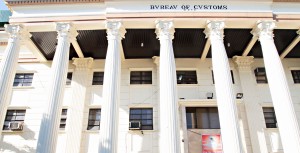Customs to go ‘paperless’ in 2015
The Bureau of Customs (BOC) wants virtually all transactions with importers to be done electronically by next year as part of efforts to promote transparency and curb corruption in the agency.
Apart from making it easier for the public to pay their dues, the use of electronic transactions will also help the BOC analyze imports data to find loopholes that could be addressed.
“We don’t think people should be able to hide,” Customs Commissioner John Philip Sevilla said at a meeting with stakeholders.
The use of electronic transactions is part of reforms being implemented at the bureau to increase collections and—since the BOC deals with foreign businesses—improve the country’s image with the international community.
“When everything is digital, there’s much less room for corruption. When everything is digital, it’s a lot easier to be transparent. I want the public to get used to a much higher degree of disclosure,” Sevilla said.
Once the use of electronic transactions is put in place, Sevilla said importers could expect a much faster processing of their payments.
Since being appointed head of the bureau late last year, Sevilla has been successful in raising collections. High-profile efforts included the BOC’s crackdowns on rice and steel smugglers as well as the frequent filing of criminal cases against alleged smugglers and internal investigations on personnel accused of corruption.
In the first quarter of the year, Customs collections rose 26 percent to P86.5 billion, missing the target for the three-month period by 9 percent. But for March alone, revenues were up 34 percent.
Other planned reforms include the use of pre-shipment inspections, particularly for cargo shipped in container vans. This means these containers will have to be inspected at their ports of origin in other countries before being loaded onto ships to be brought to the Philippines.
This will relieve some of the pressure on the BOC’s stretched resources as it will minimize the need for local authorities to inspect containers as they come in.


